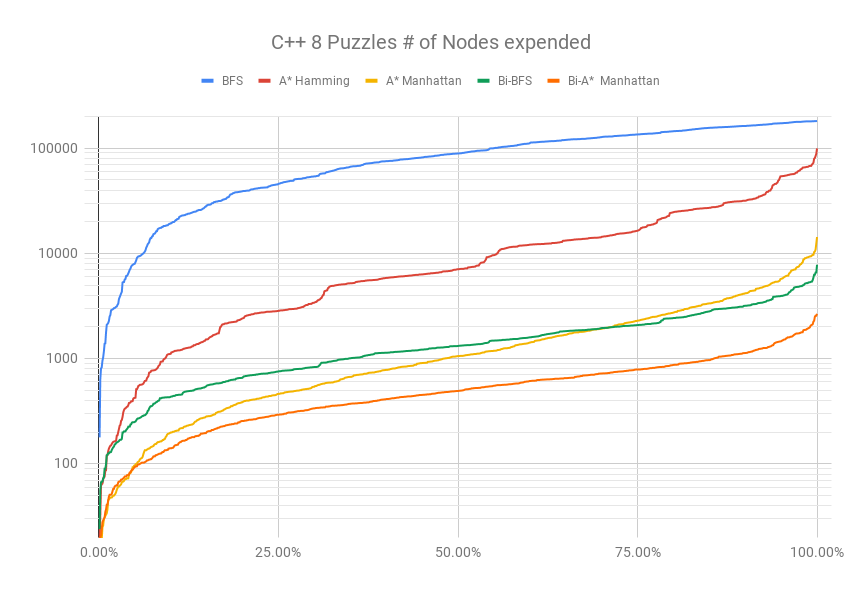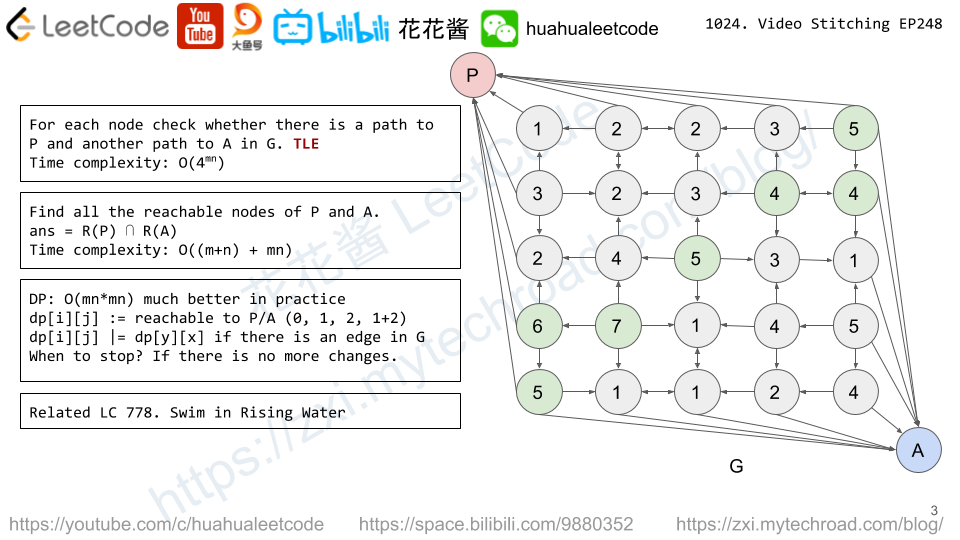#include <algorithm>
#include <array>
#include <chrono>
#include <deque>
#include <functional>
#include <iostream>
#include <memory>
#include <queue>
#include <unordered_map>
#include <unordered_set>
#include <vector>
using namespace std;
using chrono::high_resolution_clock;
constexpr int N = 3;
constexpr int dirs[] = {0, 1, 0, -1, 0};
struct Node;
typedef string State;
typedef shared_ptr<Node> NodePtr;
typedef function<int(const State& s, const State& t)> Heuristic;
struct Node {
Node(State s, NodePtr p = nullptr, int h = 0)
: s(s), p(p), h(h), g(p ? p->g + 1 : 0), f(this->h + g) {}
vector<State> GetNextStates() const {
vector<State> states;
int index = find(s.begin(), s.end(), '0') - s.begin();
int x = index % N;
int y = index / N;
for (int i = 0; i < 4; ++i) {
int tx = x + dirs[i];
int ty = y + dirs[i + 1];
if (tx < 0 || ty < 0 || tx == N || ty == N) continue;
int new_index = ty * N + tx;
State next(s);
next[index] = s[new_index];
next[new_index] = '0';
states.push_back(move(next));
}
return states;
}
NodePtr p;
int h;
int g;
int f;
State s;
};
bool Sovlable(const State& s) {
int inv_count = 0;
for (int i = 0; i < N * N; ++i) {
for (int j = i + 1; j < N * N; ++j) {
if (s[i] != '0' && s[j] != '0' && s[i] > s[j]) {
++inv_count;
}
}
}
return inv_count % 2 == 0;
}
NodePtr GetRoot(NodePtr n) { return n->p ? GetRoot(n->p) : n; }
NodePtr WirePath(NodePtr p, NodePtr n) {
while (n) {
NodePtr t = n->p;
n->p = p;
p = n;
n = t;
}
return p;
}
void ConstructPath(NodePtr node, vector<State>* path) {
while (node) {
path->push_back(node->s);
node = node->p;
}
reverse(path->begin(), path->end());
}
class Solver {
public:
virtual bool Solve(State start, State target, vector<State>* path,
int* opened, int* closed) = 0;
};
class BFSSolver : public Solver {
public:
bool Solve(State start, State target, vector<State>* path, int* opened,
int* closed) override {
int expended = 0;
unordered_set<string> seen;
deque<NodePtr> q{make_shared<Node>(start)};
while (!q.empty()) {
auto cur = q.front();
q.pop_front();
++expended;
if (cur->s == target) {
ConstructPath(cur, path);
*opened = seen.size();
*closed = expended;
return true;
}
for (const auto& s : cur->GetNextStates()) {
auto r = seen.insert(s);
if (!r.second) continue;
q.push_back(make_shared<Node>(s, cur));
}
}
return false;
}
};
class BidirectionalBFSSolver : public Solver {
public:
bool Solve(State start, State target, vector<State>* path, int* opened,
int* closed) override {
auto start_node = make_shared<Node>(start);
auto target_node = make_shared<Node>(target);
unordered_map<string, NodePtr> seen0{{start, start_node}};
unordered_map<string, NodePtr> seen1{{target, target_node}};
deque<NodePtr> q0{start_node};
deque<NodePtr> q1{target_node};
int expended = 0;
while (!q0.empty()) {
size_t size = q0.size();
while (size--) {
auto cur = q0.front();
q0.pop_front();
++expended;
for (const auto& s : cur->GetNextStates()) {
auto n = make_shared<Node>(s, cur);
auto it = seen1.find(s);
if (it != seen1.end()) {
auto p = it->second;
if (GetRoot(n)->s == target) swap(n, p);
n = WirePath(n, p->p);
ConstructPath(n, path);
*opened = seen0.size() + seen1.size();
*closed = expended;
return true;
}
if (seen0.count(s)) continue;
seen0[s] = n;
q0.push_back(n);
}
}
if (q1.size() < q0.size()) {
swap(q0, q1);
swap(seen0, seen1);
}
}
return false;
}
private:
};
struct NodeCompare : public binary_function<NodePtr, NodePtr, bool> {
bool operator()(const NodePtr& x, const NodePtr& y) const {
return x->f > y->f;
}
};
int ManhattanDistance(const State& s, const State& t) {
int h = 0;
for (int i1 = 0; i1 < N * N; ++i1) {
int i2 = t.find(s[i1]);
int x1 = i1 % N;
int y1 = i1 / N;
int x2 = i2 % N;
int y2 = i2 / N;
h += abs(x1 - x2) + abs(y1 - y2);
}
return h;
}
int HammingDistance(const State& s, const State& t) {
int h = 0;
for (size_t i = 0; i < s.size(); ++i) {
if (s[i] != t[i]) ++h;
}
return h;
}
class AStarSolver : public Solver {
public:
explicit AStarSolver(Heuristic heuristic) : heuristic_(heuristic) {}
bool Solve(State start, State target, vector<State>* path, int* opened,
int* closed) override {
unordered_map<string, NodePtr> o;
unordered_set<string> c;
priority_queue<NodePtr, vector<NodePtr>, NodeCompare> q;
q.emplace(new Node(start, nullptr, heuristic_(start, target)));
while (!q.empty()) {
auto cur = q.top();
q.pop();
if (cur->s == target) {
ConstructPath(cur, path);
*opened = o.size();
*closed = c.size();
return true;
}
if (!c.insert(cur->s).second) continue;
for (const auto& s : cur->GetNextStates()) {
auto it = o.find(s);
auto n = make_shared<Node>(s, cur, heuristic_(s, target));
if (it != o.end() && n->f >= it->second->f) continue;
o[s] = n;
q.push(n);
}
}
return false;
}
private:
Heuristic heuristic_;
};
class BiAStarSolver : public Solver {
public:
explicit BiAStarSolver(Heuristic heuristic) : heuristic_(heuristic) {}
bool Solve(State start, State target, vector<State>* path, int* opened,
int* closed) override {
unordered_map<string, NodePtr> o0, o1;
unordered_map<string, NodePtr> c0, c1;
priority_queue<NodePtr, vector<NodePtr>, NodeCompare> q0, q1;
q0.emplace(new Node(start, nullptr, heuristic_(start, target)));
q1.emplace(new Node(target, nullptr, heuristic_(target, start)));
bool farward = true;
while (!q0.empty()) {
auto size = q0.size();
while (size--) {
auto cur = q0.top();
q0.pop();
if (c0.count(cur->s)) continue;
c0[cur->s] = cur;
if (c1.count(cur->s)) {
auto p = c1[cur->s];
if (GetRoot(cur)->s == target) swap(cur, p);
cur = WirePath(cur, p->p);
ConstructPath(cur, path);
*opened = o0.size() + o1.size();
*closed = c0.size() + c1.size();
return true;
}
for (const auto& s : cur->GetNextStates()) {
auto it = o0.find(s);
auto n = make_shared<Node>(s, cur,
heuristic_(s, farward ? target : start));
if (it != o0.end() && n->f >= it->second->f) continue;
o0[s] = n;
q0.push(n);
}
}
if (q1.size() < q0.size()) {
swap(q0, q1);
swap(c0, c1);
swap(o0, o1);
farward = !farward;
}
}
return false;
}
private:
Heuristic heuristic_;
};
bool VerifyPath(const vector<State>& path, const State& s, const State& t) {
if (path.empty()) return false;
if (path.front() != s || path.back() != t) return false;
for (size_t i = 1; i < path.size(); ++i) {
Node n(path[i - 1]);
auto states = n.GetNextStates();
if (find(begin(states), end(states), path[i]) == end(states)) {
return false;
}
}
return true;
}
void StatisticsMode() {
State s{"123456780"};
State t{"123456780"};
vector<unique_ptr<Solver>> solvers;
solvers.emplace_back(new BFSSolver);
solvers.emplace_back(new AStarSolver(HammingDistance));
solvers.emplace_back(new AStarSolver(ManhattanDistance));
solvers.emplace_back(new BidirectionalBFSSolver);
solvers.emplace_back(new BiAStarSolver(ManhattanDistance));
for (int i = 0; i < 1000;) {
random_shuffle(s.begin(), s.end());
if (!Sovlable(s)) continue;
++i;
for (auto& solver : solvers) {
vector<State> path;
int opened;
int closed;
auto t0 = high_resolution_clock::now();
bool sovlable = solver->Solve(s, t, &path, &opened, &closed);
auto t1 = high_resolution_clock::now();
if (!VerifyPath(path, s, t)) {
cerr << "Invalid path!" << endl;
return;
}
auto time_span = chrono::duration_cast<chrono::duration<double>>(t1 - t0);
cout << closed << "\t" << time_span.count() * 1000 << "\t";
}
cout << endl;
}
}
int main() { StatisticsMode(); }



